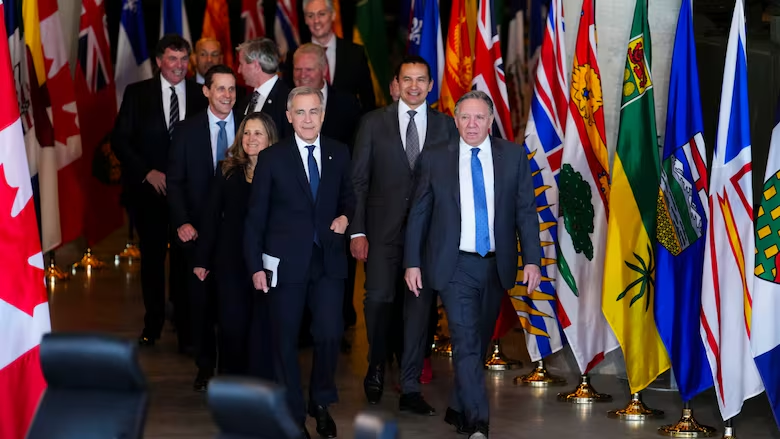Prime Minister Mark Carney is placing “nation-building projects” at the centre of his agenda as he convenes with provincial and territorial premiers this week in Saskatoon, marking the first First Ministers’ meeting since the federal election on April 28.
In an exclusive interview with CBC’s Power & Politics, Carney emphasized the need to fast-track major projects that can unify the country, diversify the economy, and position Canada for growth in international markets.
“We need to move on these nation-building projects… Projects that bring Canada together, help us export to new markets, and really move this economy forward,” Carney said. “We will truly fast-track the approval of those projects.”
The federal government plans to launch a new project review office aimed at reducing regulatory review times from five years to just two. This priority was reflected in last week’s Throne Speech, delivered by King Charles, which promised to “unleash a new era of growth.”
Carney said Ottawa is preparing to introduce legislation this month that would implement up-front regulatory approvals for projects deemed in the national interest.
As premiers prepare to pitch their priorities, regional infrastructure projects are already in the spotlight. N.W.T. Premier R.J. Simpson highlighted a proposed road through the mineral-rich Slave Geological Province, connecting western Nunavut to the Northwest Territories. He called it a long-overdue investment in Canada’s North.
Western premiers, including Manitoba’s Wab Kinew, are rallying behind a broader economic corridor stretching from the northwest coast to Hudson Bay, aimed at improving access to international markets. Kinew, in a separate interview, stressed that focusing on shared economic goals could help bridge political divisions.
“If we sit around talking about politics, it’s going to be like the family dinner table… But if we get down to work and choose economic projects to build the country — that’s how we bring people together,” Kinew said.
Ontario Premier Doug Ford has requested support for infrastructure tied to critical minerals in the Ring of Fire, and a Highway 401 tunnel project, while Saskatchewan Premier Scott Moe submitted proposals that include pipeline expansion.
Carney underscored that federal approval will not be automatic. “We’re going to have a competition with projects. Some projects are good ideas, but they’re not ready. Others are ready, but they’re bad ideas,” he said.
Beyond infrastructure, Carney reiterated his commitment to removing interprovincial trade barriers by Canada Day, aiming for full internal free trade within the country.
As Canada’s premiers gather in Saskatoon, Carney is expected to seek consensus around national priorities that go beyond politics — infrastructure that binds regions together and drives long-term prosperity.

